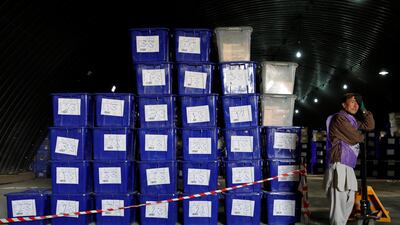In a shocking decision that took candidates and voters by surprise, a body charged with organising and managing Afghanistan’s election said on Thursday that fraud and mismanagement had rendered invalid the votes cast in the capital Kabul, during last October's parliamentary election.
The ruling by the Electoral Complaints Commission (ECC) comes after it received a total of 2,767 complaints in Kabul, according to ECC Spokesperson Ali Reza Rouhani.
Over a million citizens cast their votes in the Afghan capital, in October, to select from over 800 candidates to represent 33 seats in the national parliament.
The election process was marred with violence, allegations of fraud, as well as technical problems with biometric voter verification gear and inaccurate voter lists.
Election results for five Afghan provinces were announced in the weeks following the elections, but authorities have still not released the results for Kabul. The latest ruling by the ECC may further delay results.
“There were serious outstanding problems in Kabul that could hurt the fairness, transparency and inclusiveness of the election,” Mr Rouhani told local media. The statement included a list of 24 points justifying the decision.
The decision by the ECC prompted a backlash from candidates as well as Afghanistan's top election authority.
“Are they [ECC] mocking people and candidates?” Habiba Qaderi, a candidate from Kabul city, asked rhetorically, adding that the latest decision undermines the current electoral system.
“How can we ask people over and again to come and vote in another election. They will lose faith in the system,” she told The National. “[Some] people lost their lives for the sake of this democratic process, others were injured during elections and they still haven’t recovered. How can we ask them to come back for polls again?” she added.
Ms Qaderi admitted that fraud was commited, but encouraged the ECC to take action against candidates who have been accused of misconduct, instead of invalidating the results for all candidates.
“There are complaints against certain candidates. In Kabul, it is pretty clear who committed fraud. Take them out of the list, instead of jeopardizing the whole process,” she said.
The Independent Election Commission also rejected the ECC’s decision, exposing deep political rifts between the two bodies charged with organising and managing the election.
In a rushed press conference held on Thursday evening, Gulajan Abdul Badi Sayyad, the chairman of the IEC said the ECC’s decision was made without their consultation. He described the move to invalidate votes as a “political, sentimental, unrealistic decision" that "is not based on credible evidence."
Mr Sayyad also claimed that the ECC did not have the authority to invalidate votes.
“This decision is illegal since the Independent Election Commission is the only body that can make decisions on elections,” he said, accusing the ECC of trying to sabotage the elections.
Apart from annulling Kabul votes, the ECC on Thursday also fined five IEC officials for mismanagement and failure to fulfil their duties. This was also dismissed by the IEC, stating that the former had no legal authority over the organisation.

